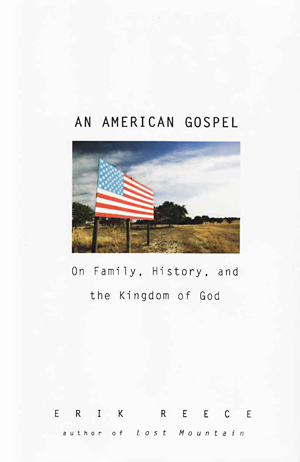 A great sense of occasion is present when a friend publishes a book, but there’s a particular pulse of pleasure I’m getting from the arrival of Erik Reece’s An American Gospel: On Family, History, and the Kingdom of God. Erik has published two fine essays with this magazine, the second of which, “Jesus Without the Miracles”, I got to read in manuscript on a packed and rainy miserable ride on a commuter train some years ago. Against my better impulses as a civically-minded human, I did dial my cellphone that afternoon while squeezed between other unhappy commuters, and did tell Erik that the essay was extraordinary.
A great sense of occasion is present when a friend publishes a book, but there’s a particular pulse of pleasure I’m getting from the arrival of Erik Reece’s An American Gospel: On Family, History, and the Kingdom of God. Erik has published two fine essays with this magazine, the second of which, “Jesus Without the Miracles”, I got to read in manuscript on a packed and rainy miserable ride on a commuter train some years ago. Against my better impulses as a civically-minded human, I did dial my cellphone that afternoon while squeezed between other unhappy commuters, and did tell Erik that the essay was extraordinary.
What did I like about it? Consider this paragraph:
[W]hen I first discovered the Gospel of Thomas about a decade ago, I was shocked to find a version of Christianity that I could accept and one that, moreover, could serve as a vital corrective to my grandfather’s view that we live helplessly, sinfully, in a broken world. According to Thomas’s Jesus, humankind never suffered an irredeemable Fall. The world only appears to be a realm of separation from the Creator and from one another. When Thomas’s Jesus tells his followers that “Adam came from great power and great wealth, but he was not worthy of you,” he is implying that Adam’s first sin was to take on the knowledge of good and evil–the knowledge that continues to divide the world into us and them. The stunning message of Thomas’s gospel is that such divisions are arbitrary, destructive, and, finally, unnatural. Only the talking animals believe in them. Thus Adam’s sin, ironically, was simply ignorance. True, that ignorance proved to be congenital, but it wasn’t terminal and it didn’t demand divine intervention. What it demanded was a realization on the part of each individual that he or she still possesses a divine light lodged within the heart, and that light can reveal the world to be a beautiful, undivided wholeness.
Erik’s style of writing is a style of thinking, artfully clear and passionately plain, plain in the way of Shaker furniture where form is a distillation of purpose. Erik has turned his past attention to matters that matter most to him, the land and man’s role in it in Lost Mountain (which began as an essay for this magazine, “Death of a Mountain”), and now looks, in An American Gospel, to man’s role in God’s kingdom, which Reece asks us to consider might better be thought of as Planet Earth.
That’s too simple a parsing of what is much more complicated terrain, much in the way that the stamp of “memoir” is too diminishing a category for the kind of long intellectual essay that An American Gospel occupies—an essay that also manages to tell Erik’s own complex family story about the role that faith played for his fundamentalist Baptist preacher grandfather and Baptist minister father. It’s a very rare writer who can manage to mix a deep knowledge of scripture (secular and non-) with a naturalist’s sense of nature’s textures and an activist’s righteous anger and produce from them an intellectually serious and artfully rigorous book like An American Gospel.
































































































